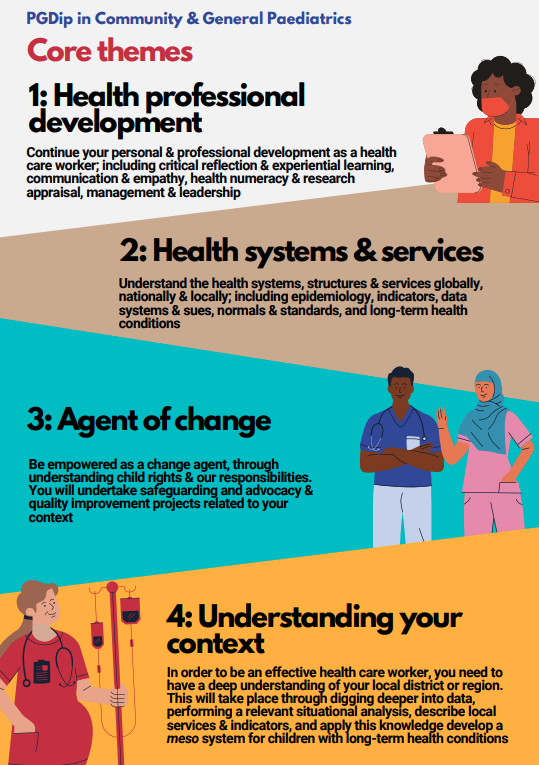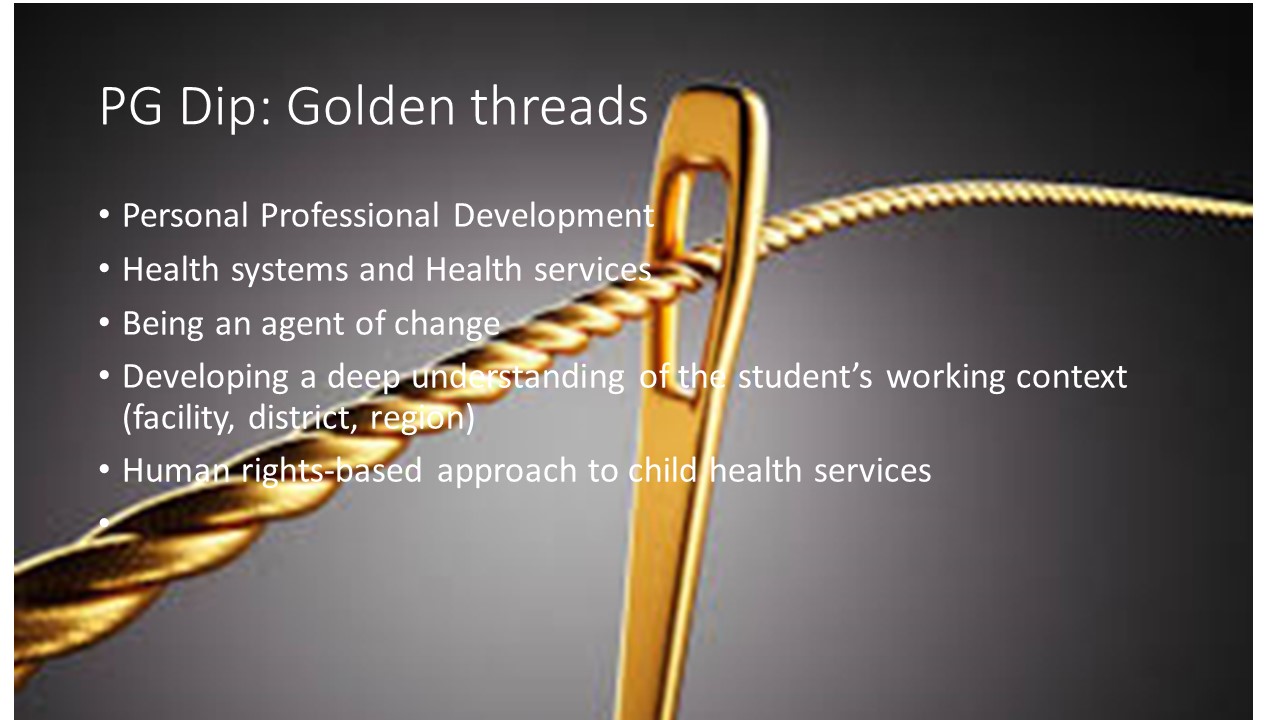Content begins here
Main page content
Click to collapse
Postgraduate Diploma in Community & General Paediatrics
This is a two-year part-time programme that is relevant to the National Department of Health’s re-engineering of primary health care strategy. The skills and knowledge gained are aligned with the requirements of posts for the District Clinical Specialist Teams (DCST) and for clinicians who are working within the field of community and general paediatrics. The programme can be taken by paediatricians, medical officers health and rehabilitation professionals, registered nurses and medical social workers who might not want to sub-specialise.
The purpose of the programme is to assist early- and mid-career clinicians in acquiring critical and reflective skills to understand, analyse and apply knowledge in child public health, specifically exploring: advocacy and children’s rights; child health policies and programmes; optimal management of long-term and disabling conditions (LTDCs); health management and leadership; quality improvement; health information systems; epidemiology and research appraisal; infant, child and adolescent mental health; skills in communication with children and caregivers; and adult education and training.

Programme Learning Outcomes
At the end of the programme, students should have gained the ability to identify concepts relevant to the areas identified below. Additionally, students should be capacitated to critically appraise, engage with and apply skills learned in the programme related to:
|
Courses & Delivery
The courses offered in this programme in 2025 will be:
|
Core courses |
Credits |
Sequence |
Conveners & Lecturers |
|
Advocacy & Children’s Rights |
10 |
Year 1, Semester 1 |
Lori Lake, Lucy Jamieson |
|
Epidemiology & Research Appraisal |
15 |
Year 1, Semester 1 |
Dave le Roux |
|
Experiential Learning |
15 |
Year 1, Semester 1 |
Sa-eeda Chippendale, Tony Westwood, Mwiche Sichula |
|
Health Information Systems |
10 |
Year 1, Semester 2 |
Dave le Roux, Tony Westwood, Neil McKerrow |
|
Child Health Policies and Programmes |
15 |
Year 1, Semester 2 |
Lizelle Jacobs, Tanya Doherty, Max Kroon, Thandi de Wit |
|
Optimising Clinical Care for Long-term and Disabling Health Conditions |
10 |
Year 2, Semester 1 |
Shirani Naidoo, Lizelle Jacobs, Tony Westwood |
|
Child Protection, Abuse & Neglect |
10 |
Year 2, Semester 1 *elective |
Dave le Roux, Lizelle Jacobs |
| Infant, Child & Adolescent Mental Health |
10 |
Year 2, Semester 1
|
Bulelwa Mpinda, Wendy Vogel, Lizelle Jacobs |
|
Communication, Education & Training |
10 |
Year 2, Semester 1 *elective |
Lizelle Jacobs, Michael Hendricks |
|
Health Management & Leadership |
15 |
Year 2, Semester 2 |
Tamara Kerbelker, Mereille Pursad, Anthony Hawkridge, Michael Hendricks |
|
Quality Improvement in Clinical Practice |
15 |
Year 2, Semester 2 |
Tony Westwood, |
This is a blended programme which will be delivered as synchronous and asynchronous online teaching and learning sessions. A compulsory block week of online teaching will take place at the beginning of the first semester in the first year, and will be followed by the online components of the different courses. The other courses will comprise two compulsory synchronous lecture days followed by the online components.
Date for 2026 block week lectures to be confirmed
First year: 5 days in Jan 2026
2 days in July 2026
2 days in September 2026
Second year: 5 days in Jan 2026
2 days in March 2026
2 days in May 2026
2 days in July 2026
2 days in September
[Note: It is possible to register for certain courses (eg Infant, Child Adolescent Mental Health) on an occasional basis, without registering for the entire 2 year PG Dip, subject to course convenor approval.

The courses are divided into Units which are delivered over one to three weeks depending on the course. Each Unit consists of:
- Learning outcomes
- Course content
- Resources (core, recommended and additional readings, presentations, web links)
- Learning tasks (forum responses, chat sessions, tasks related to assignments)
- Please note: Forum discussions, chatrooms, blogs on Vula and Google Docs may be used for online engagement and interactive learning. This space should be respectful, collegial and collaborative; hence everyone is expected to contribute to building and making the space a positive learning environment.
Please see the 2025 Faculty Handbook for more information about the programme and courses.
For support available to students at the Faculty of Health Sciences, see the "Additional support" tab on the sidebar.
If you have any questions, please contact our administrator Ms Debbie Moodie (Debbie.Moodie@uct.ac.za) or (021) 658 5316 or the programme convenors Dr Dave le Roux (Dave.leRoux@uct.ac.za or Dr Lizelle Jacobs (Lizelle.Jacobs@uct.ac.za).
We look forward to welcoming you to the PG Diploma in Community and General Paediatrics!